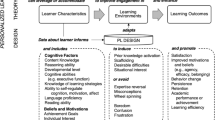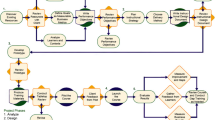Abstract
Medical school curricula often provide insufficient time and instruction for health behavior change counseling. We examined the feasibility of blending classroom and distributed learning experiences to teach medical students how to initiate health behavior change counseling and analyzed the impact of this approach on their attitudes, knowledge, and skills. Usage patterns and pre- to post-class attitude and knowledge changes were assessed with self-report questions among 153 third year family medicine clerkship students. Most students viewed at least 90% of the online written content and took an average of 41 min (SD = 24 min 35 s) to view all of the content. Students’ confidence in their ability to help patients change unhealthy behaviors significantly improved (p < .01). The blended learning curriculum facilitated learning of behavior change skills, encouraged interaction with course materials, and improved medical students’ self confidence for using health behavior change skills.

Similar content being viewed by others
References
Association of American Medical Colleges Institute for Improving Medical Education. (2007). Effective use of educational technology in medical education. Washington, DC: AAMC.
Abid, A., Galuska, D., Khan, L. K., Gillespie, C., Ford, E. S., & Serdula, M. K. (2005). Are healthcare professionals advising obese patients to lose weight? A trend analysis. Medscape General Medicine, 7, 10. Retrieved from http://www.medscape.org/viewarticle/514048.
Bell, K., & Cole, B. A. (2008). Improving medical students’ success in promoting health behavior change: a curriculum evaluation. Journal of General Internal Medicine, 23, 1503–1506. doi:10.1007/s11606-008-0678.
Brown, R. L., & Oriel, K. (1998). Teaching motivational interviewing to first-year students. Academic Medicine, 73, 589–590.
Brown, R. L., Pfeifer, J. M., Gjerde, C. L., Seibert, C. S., & Haq, C. L. (2004). Teaching patient-centered tobacco intervention to first-year medical students. Journal of General Internal Medicine, 19, 534–539. doi:10.1111/j.1525-1497.2004.30144.
Burke, B. L., Arkowitz, H., & Menchola, M. (2003). The efficacy of motivational interviewing: a meta-analysis of controlled clinical trials. Journal of Consulting and Clinical Psychology, 71, 843–861. doi:10.1037/0022-006X.71.5.843.
Chickering, A., & Ehrmann, S. (1996). Implementing the seven principles: Technology as lever. AAHE Bulletin, 49, 3–6.
Clark, R., & Mayer, R. (2003). e-Learning and the science of instruction. San Francisco, CA: Pfeiffer Publishing.
Committee on Behavioral and Social Sciences in Medical School Curricula, Cuff, P., & Vanselow, N. (Eds.). (2004). Improving medical education: enhancing the behavioral and social science content of medical school curricula. Washington, DC: National Academies Press.
Cook, D. A., Thompson, W. G., Thomas, K. G., Thomas, M. R., & Pankratz, V. S. (2006). Impact of self-assessment questions and learning styles in web-based learning: a randomized, controlled, crossover trial. Academic Medicine, 81, 231–238.
Driscoll, M. P. (2005). Psychology of learning for instruction. Boston: Pearson Education/Allyn & Bacon.
Ellerbeck, E. F., Ahluwalia, J. S., Jolicoeur, D. G., Gladden, J., & Mosier, M. C. (2001). Direct observation of smoking cessation activities in primary care practice. Journal of Family Practice, 50, 688–693.
Fordis, M., King, J. E., Ballantyne, C. M., Jones, P. H., Schneider, K. H., Spann, S. J., et al. (2005). Comparison of the instructional efficacy of Internet-based CME with live interactive CME workshops: A randomized controlled trial. JAMA, 294, 1043–1051. doi:10.1001/jama.294.9.1043.
Gagne, R. M., Wager, W. W., Golas, K. G., & Keller, J. M. (2005). Principles of instructional design. Toronto: Thomson Wadsworth.
Galuska, D. A., Will, J. C., Serdula, M. K., & Ford, E. S. (1999). Are health care professionals advising obese patients to lose weight? JAMA, 282, 1576–1578.
Graham, C. R. (2005). In C. J. Bonk & C. R. Graham (Eds.), The handbook of blended learning: Global perspectives, local designs (pp. 3–21). San Francisco, CA: Pfeiffer Publishing.
Haas, L. J., & Gregory, M. C. (2000). Teaching behavior change skills to first-year medical students: A small group experiential approach. Education for Health (Abingdon), 13, 337–345. doi:10.1080/135762800750059453.
Heywood, A., Firman, D., Sanson-Fisher, R., Mudge, P., & Ring, I. (1996). Correlates of physician counseling associated with obesity and smoking. Preventive Medicine, 25, 268–276. doi:10.1006/pmed.1996.0056.
Kerfoot, B. P., Baker, H., Jackson, T. L., Hulbert, W. C., Federman, D. D., Oates, R. D., et al. (2006). A multi-institutional randomized controlled trial of adjuvant web-based teaching to medical students. Academic Medicine, 81, 224–230.
Kreuter, M. W., Chheda, S. G., & Bull, F. C. (2000). How does physician advice influence patient behavior? Evidence for a priming effect. Archives of Family Medicine, 9, 426–433.
Lane, C., Hood, K., & Rollnick, S. (2008). Teaching motivational interviewing: Using role play is as effective as using simulated patients. Medical Education, 42, 637–644. doi:10.1111/j.1365-2923.2007.02990.
Martino, S., Haeseler, F., Belitsky, R., Pantalon, M., & Fortin, A. H. (2007). Teaching brief motivational interviewing to year three medical students. Medical Education, 41, 160–167.
Miller, W. R., & Rollnick, S. (2002). Motivational interviewing (2nd ed.). New York: Guilford Press.
Mokdad, A. H., Marks, J. S., Stroup, D. F., & Gerberding, J. L. (2004). Actual causes of death in the United States, 2000. JAMA, 291, 1238–1245.
Moore, J., Sener, J., & Fetzner, M. (2006). Getting better: ALN and student success. Journal of Asynchronous Learning Networks, 10, 55–84.
Moser, E. M., & Stagnaro-Green, A. (2009). Teaching behavior change concepts and skills during the third-year medicine clerkship. Academic Medicine, 84, 851–858. doi:10.1097/ACM.0b013e3181a856f8.
Picciano, A. (2002). Beyond student perceptions: Issues of interaction, presence, and performance in an online course. Journal of Asynchronous Learning Networks, 6, 21–40.
Poirier, M. K., Clark, M. M., Cerhan, J. H., Pruthi, S., Geda, Y. E., & Dale, L. C. (2004). Teaching motivational interviewing to first-year medical students to improve counseling skills in health behavior change. Mayo Clinic Proceedings, 79, 327–331.
Prochaska, J., DiClemente, C., & Norcross, J. (1992). In search of how people change: Applications to the addictive behaviors. American Psychologist, 47, 1102–1114.
Prochaska, J., Johnson, S., & Lee, P. (2009). The transtheoretical model of behavior change. In S. A. Shumaker, J. K. Ockene, & K. A. Riekert (Eds.), The handbook of health behavior change (pp. 59–83). New York: Springer.
Rollnick, S., Miller, W. R., & Butler, C. C. (2008). Motivational interviewing in health care. New York: Guilford Press.
Rubak, S., Sandbaek, A., Lauritzen, T., & Christensen, B. (2005). Motivational interviewing: A systematic review and meta-analysis. British Journal of General Practice, 55, 305–312.
Sargeant, J., Curran, V., Allen, M., Jarvis-Selinger, S., & Ho, K. (2006). Facilitating interpersonal interaction and learning online: Linking theory and practice. Journal of Continuing Education Health Professions, 26, 128–136.
Simonson, M., Smaldino, S. E., Albright, M., & Zvacek, S. (2008). Teaching and learning at a distance: Foundations of distance education (4th ed.). Upper Saddle River, NJ: Prentice Hall.
Spollen, J. J., Thrush, C. R., Dan-Vy, M., Woods, M. B., Tariq, S. G., & Hicks, E. (2010). A randomized controlled trial of behavior change counseling education for medical students. Medical Teacher, 32, e170–e177. doi:10.3109/01421590903514614.
Stafford, R. S., Farhat, J. H., Misra, B., & Schoenfeld, D. A. (2000). National patterns of physician activities related to obesity management. Archives of Family Medicine, 9, 631–638.
Vasilaki, E. I., Hosier, S. G., & Cox, W. M. (2006). The efficacy of motivational interviewing as a brief intervention for excessive drinking: A meta-analytic review. Alcohol and Alcoholism, 41, 328–335. doi:10.1093/alcalc/agl016.
Vogt, F., Hall, S., & Marteau, T. M. (2005). General practitioners’ and family physicians’ negative beliefs and attitudes towards discussing smoking cessation with patients: A systematic review. Addiction, 100, 1423–1431.
Wiecha, J., Chetty, V., Pollard, T., & Shaw, P. (2006). Web-based versus face-to-face learning of diabetes management: The results of a comparative trial of educational methods. Family Medicine, 38, 126–132.
Zhang, D. (2005). Interactive multimedia-based e-learning: A study of effectiveness. American Journal of Distance Education, 19, 149–162. doi:10.1207/s15389286ajde1903_3.
Author information
Authors and Affiliations
Corresponding author
Additional information
The opinions and statements in this article are the responsibility of the authors, and such opinions and statements do not necessarily represent the policies of the Department of Defense, the United States Department of Health and Human Services, or their agencies.
Rights and permissions
About this article
Cite this article
Goodie, J.L., Williams, P.M., Kurzweil, D. et al. Can Blended Classroom and Distributed Learning Approaches be Used to Teach Medical Students How to Initiate Behavior Change Counseling During a Clinical Clerkship?. J Clin Psychol Med Settings 18, 353–360 (2011). https://doi.org/10.1007/s10880-011-9261-4
Published:
Issue Date:
DOI: https://doi.org/10.1007/s10880-011-9261-4




